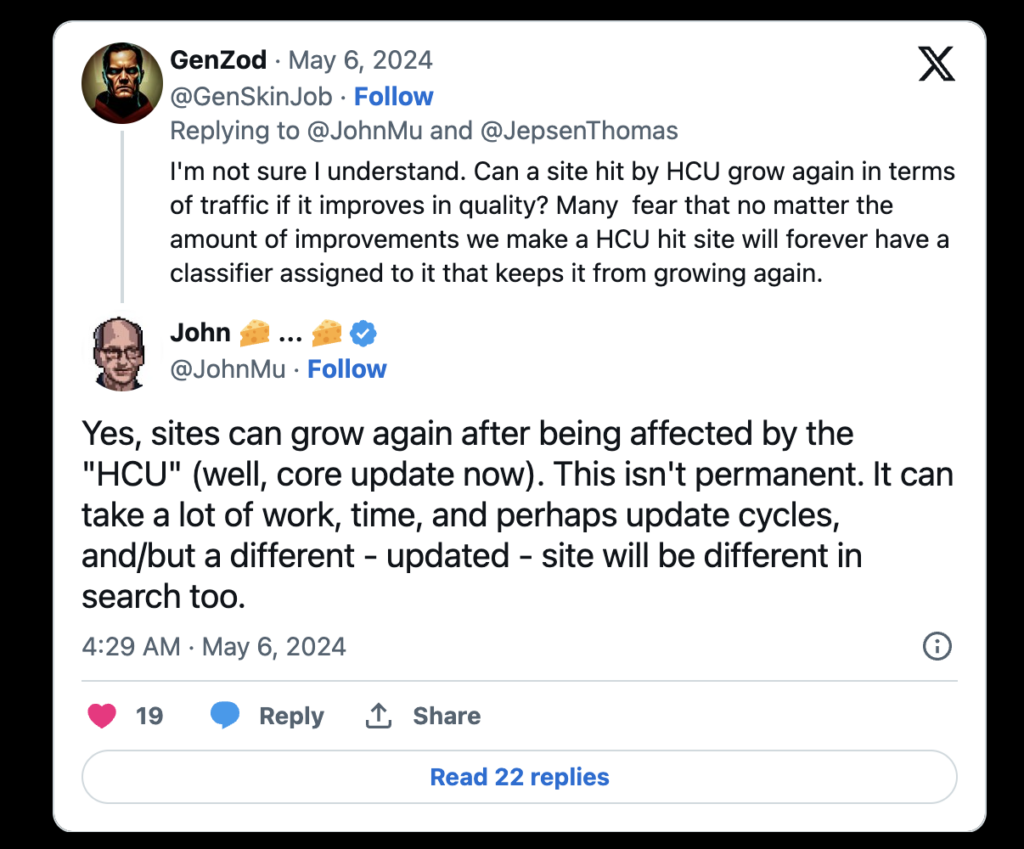Another month, another Google update. Are you as tired of these updates as we are? Can we get a %*$& YES 🙌🏻? As this becomes our new normal, we’re seeing more drops in traffic and what seem like random fluctuations in rankings and traffic – but what does this all mean?
My traffic has dropped significantly. Is it normal?
You’re not alone. The latest Google update in August 2024 has left many creators scratching their heads as their rankings drop.

Paulina Rubia, Paulina on the Road:
“I’ve been following all the SEO rules and recommendations. Doing what put my site at 120k monthly sessions, and nothing seems to stop the decrease.”
Yes, a few creators have noticed some improvement, but the truth is, most are still feeling the sting. The update has left many people in the same boat, with no clear path to recovery in sight.

Kayla Duford, K & Family Adventures:
“My rankings, impressions, and traffic are all down. But it does seem like it’s being a bit wonky. My real-time site visits seem about the same, but my analytics the next day are much lower. I also have posts up 300% for traffic and others down that much. So I’m confused.”
But there might be some light at the end of the tunnel. Search Engine Land has reported that for the first time ever, “we are seeing signs of life for sites that were negatively impacted by the September 2023 helpful content update.”

Anastasia Finch, Just Gone Wandering:
“I made it through the last update(s) with no issues but got hit with this one. I’m seeing very slight increases again in the last few days, so I’m hoping it will recover!”
Why did my Domain Authority metrics decrease?
Domain Authority (DA) is a metric developed by Moz that predicts how well a website might rank on search engine result pages. DA is based on factors like the number of root domains linked to your site and the overall number of links.
However, it’s important to remember that DA is not something Google uses to determine your rankings. While seeing your DA drop can be disheartening, it doesn’t necessarily reflect your site’s true performance in Google’s eyes.
So, why might your DA be plummeting?

Keri Hedrick, Our Globetrotters:
“I believe it’s because so many of our sites were hit by updates and ranking changes. Losing the first few spots on page 1 dramatically drops the frequency of other sites organically linking to you. Legit sites and the scrapers. Other blogger sites we may have swapped with, contributed to, etc., in the past are also dropping or having content clearouts of anything they think will ‘displease Google.’ So it’s a vicious cycle.”
☝️ While DA can be a helpful benchmark, it’s not a ranking factor, and the degree to which it correlates with Google’s ranking system is unclear.
Why am I seeing zero page views and sessions in GA4?
Don’t panic. There are two main reasons you might be seeing zero page views, according to Simon Zhelyazkov from Backpack Moments:
- A Google-side problem: Sometimes Google encounters issues affecting data reporting.
- A disconnection or glitch on your side: A common issue is that your GA4 tracking code has glitched or become disconnected. This can happen for various reasons, like updates to your site or changes in your analytics settings. The fix is usually straightforward: simply re-add the tracking code to your site, and GA4 should start collecting data again.
Adding to the chaos, a ranking bug unrelated to the update caused unexpected drops in rankings for many sites. It was a purely technical bug, with no link to quality or type of content, and was fixed on August 20.
☝️To keep track of any ongoing or resolved Google-related issues, you can always check the Google Status Dashboard.

Marya Sutimi, BeauTraveler:
“Sometime last year, I had the same issue when there was no data for days on GA4, so I had to switch off the Monsterinsights I used then before it started working again. When I realized there was no data since yesterday, I was thinking about resubmitting the GA4 code, too, but was hesitant since I can still see the real-time users. So I just assumed it was a glitch unless it remains that way for a week.”
Will my site’s traffic increase now that the Google bug’s been fixed?
The Google bug that caused issues for many sites was officially fixed on August 20. However, this doesn’t guarantee that traffic to your website will increase.

Jenn Lebryk Johnson, Those Johnson Boys:
“Nothing improved with my traffic since the bug was fixed either. My site has officially crashed and burned, and I’m feeling completely lost.”
Google’s updates are very demotivating. What should I do?
1. Don’t give up
It’s no secret that Google’s updates can feel like a punch to the gut, especially when you’ve put so much effort into your site. But it’s important to remember that recovery is possible.
According to reports from SERoundtable, there have been signs of life for sites that were hit hard by the September update and saw no improvements until recently.
And, although it might be tough to take at face value, Google’s John Mueller mentioned in May that sites could grow again after being affected by updates.


Ahmet Kaplan Elçi, SEO expert and founder of TAXIYO:
“We must accept that core updates are natural in software development. Each update causes temporary disruptions in information processing, especially with complex systems like Google’s. So I recommend waiting at least three months before making major changes to your site, as search results take time to stabilize.”
2. Explore other traffic sources
Diversifying your traffic sources can help you weather the storm of Google updates. From social media and email marketing to paid ads and collaborations, there are numerous strategies to bring traffic to your site.
Want to learn more? Here are some other articles to check out:
- How to use Pinterest to get traffic: tips to boost your travel blog
- Getting more traffic to your blog from Flipboard
- Using Facebook to drive traffic to your travel blog… is it worth it?
3. Don’t panic until the update is fully rolled out
Google updates usually take about a month to fully roll out, and during this time, it’s common to see fluctuations in your site’s performance. Give it time.

Nicholas Aaron Rosen, The World Overload:
“Keep it because you enjoy it. HCU constantly has things going up and down, so your traffic could increase in another 4–6 months.”

Ahmet Kaplan Elçi, SEO expert and founder of TAXIYO:
“Getting penalized and getting hit are two different concepts. A site can be hit even though all its metrics are correct. But if the site consists of quality content, it might start to return to its old visitor levels over time without any additional work.”
And even if your traffic remains down, it’s not the end of the world – just a signal to pivot your strategy and continue to create quality content.
4. Keep creating quality content
No matter how demotivating the perpetual Google updates are, continuing to make quality content is the best strategy, even in these turbulent times.

Ahmet Kaplan Elçi, SEO expert and founder of TAXIYO:
“As always, the best step to take is to continue producing quality content and continue working to strengthen your site’s metrics. In the first crawl initiated after a core update, a post of yours may fall three pages. This does not mean that the core update is penalizing you. It may return to its old place when all stages of crawling and processing are completed.”
5. Focus on the long term
The heyday of blogging may be behind us, but that doesn’t mean it’s time to throw in the towel. This is our new reality, and while it might seem frustrating and unfair, it’s the world we’re operating in.
The best thing we can do is hang in there, adjust when necessary, strategize, and commit to the long haul. Every industry is facing changes, not just blogging. The ones who don’t give up and adapt to the times will come out on top.

Annie Blay, Your Friend The Nomad:
“My site was never impacted by past HCUs, but every single article suddenly dropped in rankings with this new update.
How I’m reacting: I’m not letting a few days of low traffic (or even a few weeks or months) ruin everything I’ve worked for.
Rather than quitting or doing something else drastic, I’m continuing to write helpful travel guides and focusing on alternative traffic sources.
Once there is more information about what Google is looking for in this new update, I’ll go back and adjust my old articles. It is important to update them every year anyhow, so it’s not a big deal to me to make some adjustments based on this HCU.
I’m thinking a bit more about Pinterest than I was before. I’m also thinking a whole lot about creating what my readers want rather than what was successful before this update.”
6. Keep up to date with changes in the industry
Make it a habit to regularly check in on industry news (might we recommend the Travelpayouts blog?), follow updates from reliable sources, and participate in communities where you can share insights with others facing the same challenges.
By staying up to date, you’ll be better equipped to anticipate changes, adapt your approach, and continue to grow, even when the road gets tough.
Final thoughts: surviving the Google update
Watching your hard work take a hit is never easy, and we want you to know we’re right there with you. We at Travelpayouts are committed to supporting you through these challenging times.
As the landscape shifts, we’ll closely monitor Google’s updates and how they affect our community. We’ll update this article with the latest information and prepare additional resources to help you navigate these changes.
Good luck, and stay strong, creators!




